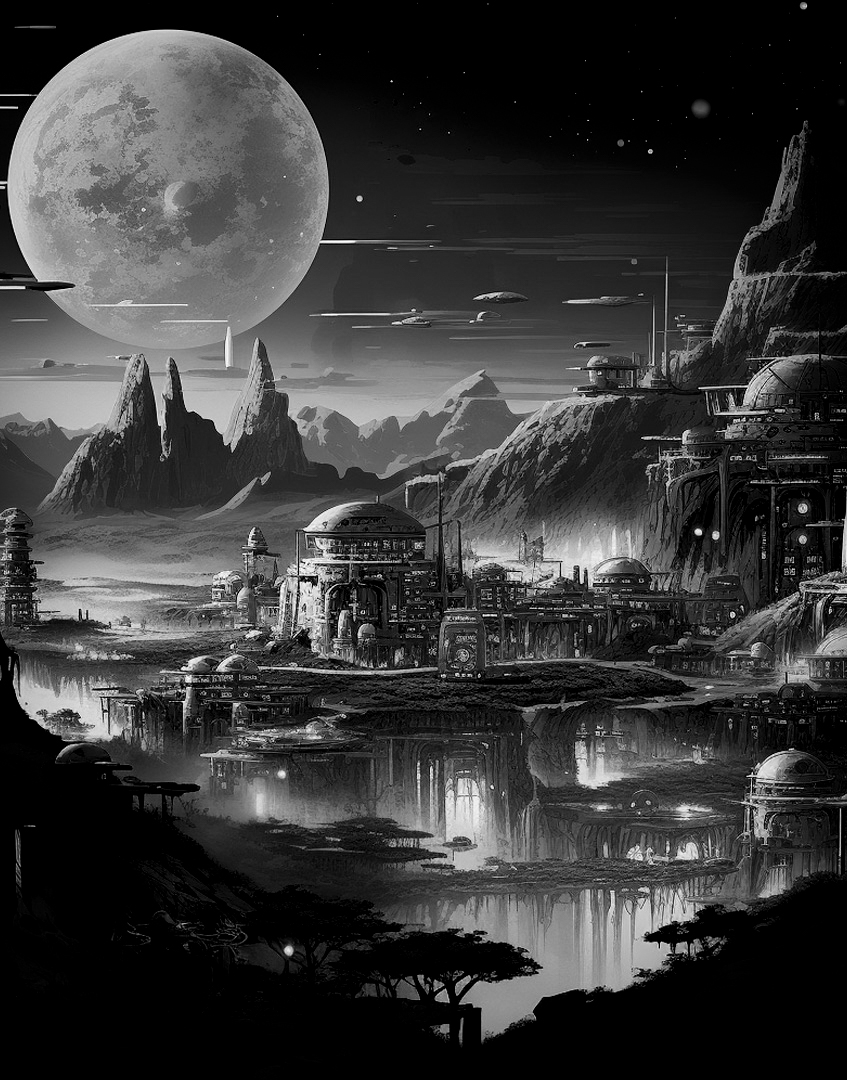The Story is Intergalactic
Outer Space Theme
My friends who read A Perfect Finish recognize the outer space theme from my own commonly-used banter. Akiko’s outer space insults are over the top. Steve spacing out as he peers through a window when he should be paying attention is introduced early in the story, the first time a window is mentioned. All the space out quotes, moon-beaming, cosmic thoughts, and Meriwa being compared to Jupiter are threaded throughout the book. Is there a point to the entire outer space theme?
Cosmic Perspective
The story invites the reader to adopt a cosmic perspective, urging one to contemplate their place within the vast expanse of the universe. Steve extrapolates the Butterfly Effect to a universal scale, proposing that Ghandi’s principles hold potential for reverberation throughout the cosmos.
Center of the Center
A decade ago, my sister came to visit me in Denver. She declared that Fort Wayne was better than Denver. Her argument went something like this:
The United States is the center of the world. The Midwest is located in the center of the United States. Indiana is the center of the Midwest. Fort Wayne is located in the center of Indiana. Since I live in Fort Wayne, I am at the center of the center of the center.
How do the 1.4 billion people living in the “Middle Kingdom” feel about my sister’s analysis?
This line of thinking has corollaries to the Pope’s 17th century reaction to Galileo’s heliocentric perspective which is mentioned in Global Warming.
The Next Heartbeat
Steve sums up his cosmic perspective in a couple of passages, the first of which is in his River Speech. Readers have questioned my description of Simon and his quirks, but of all the scenes, none is more authentic than the one with Steve and Simon at the river. It just goes to prove that the quirkiest parts of a story are based on real life–you just can’t make this stuff up. The River Speech extracted from Chapter 15: Drop in the River goes like this:
Steve had contemplated precisely that the night before as he had stood near that very spot and stared at the Yukon River. So, for this question he was well prepared. “Before us roars the Yukon River, its waters flowing continually for centuries, day and night, week after week, year after year. I was in Denver last week, yet here flowed the Yukon River, pulsing through the heart of Whitehorse.”
Simon set his Harder on the rail and stared expectantly at Steve. Steve paused to consider the river’s source and destination, its magnificent depth, velocity, and sheer volume before continuing.
“Time flows like a river, bearing the spirits of those who have lived on this earth. Each drop of water in the river represents a soul, destined to be forgotten in the depths of the Bering Sea. Most lives fade into obscurity, etching not even a trace in the annals of history. How many souls are remembered two hundred years after their passing? In the end, what remains of any of us? A mere drop on this earth, and this earth itself? A trifling speck in the dustpan of the galaxy. Yet here we stand tonight, you and I, on this speck, observing the majestic spectacle of the mighty Yukon River ushering an eternity of souls to the Bering Sea.”
The line of thinking is expanded in the following extract from Chapter 39: Cosmic Butterflies:
Steve hung up and returned to his window. On the riverwalk, a young mother jogged behind a stroller with an Alaskan Husky on a lead, heading downriver in the direction of the drops.
Gandhi’s life was like the flapping of butterfly wings. It was a noble achievement to change the world, but changing the cosmos is a feat of an entirely different magnitude. Can the ripple effect of Gandhi’s actions grow strong enough to spread like a solar wind and have a lasting impact on the cosmos?
Akiko’s entrance shattered the moment, like a searing meteor bursting into the atmosphere. “Hey Space Case, what have you been up to today, besides looking out your porthole?”
“A little hiking, pondering the meaning of the universe, you know, the usual. Up to now, it’s been a great day.”
“Yoda, oh Yoda, do tell. What is the meaning of the universe?” asked Akiko with a snicker.
“I’m glad you asked. You may not know this, but our solar system is in a bit of a pickle and it’s our job to save it. That’s why we’re here, you know, to do our part.”
“Hocus fucking pocus. Go on, this should be good.” Akiko sat in Steve’s desk chair. She wore the smug smile of a twelve-year-old bully, as she swiveled back and forth.
Steve continued, “In just five-point-eight billion years, roughly six cosmic heartbeats, the sun will become a red giant. During the ensuing billion years it will vaporize Mercury, Venus and our own moon. Life will be wiped from Earth, but could flourish on other planets and moons, particularly Europa–the icy moon of Jupiter. Then, our sun will transform into a white dwarf and lose enough mass to possibly free some of its remaining planets, such as Jupiter and all her moons into outer space. As Elon has stated, for human survival, we must become interplanetary in a hurry. A lot could happen in the next six heartbeats.”
“Very interesting, Chewy,” said Akiko with her mischievous grin. “It does sound like quite the emergency, but you haven’t explained your own pivotal role in our quest to rescue mankind.”
“Since childhood, we dreamed of encountering spacemen, but reality is, life in the universe is rare. It’s quite possible that we will become spacemen before any spacemen discover us. If that’s the case, then it’s up to us to ensure that the spacemen we become are virtuous, not evil. That’s how the course of human history on Earth will potentially influence the course of the universe. It’s our job to ensure that our race is virtuous, so when the time comes, we will project virtue into space.”
“Very deep, Captain Kirk. I see why you require so much time to ponder these things. What would we possibly do without you?” She made a point of acting as though she were going to get up and hand him a note. “Have you considered what you are going to do when Mercury delivers the notice that your reality check has bounced?” She mockingly put her hand on her mouth in fake surprise, before settling back in Steve’s chair. “All this brings me to my real question: what do you think of this death camp business? I mean, since we’re actually doing it now, how do you really feel about helping these grannies hop off a plane?”
“I’m not sure their hop-offs are going to make the news in the Galaxy Gazette. Of course, there is the butterfly effect. I mean, Gandhi may not have become the force he was without the influence of his grandmothers. So, even though they are past the age of procreation, conceptually, the women could still have a lasting meaningful impact on the development of their grandkids.”
What does outer space and global warming have to do with end-of-life choices? Even though Akiko, in this scene, doesn’t explicitly agree with Steve’s outer space spiel, in other scenes she endorses the global warming connection and shows some appreciation for his other-worldly views on life and death.
Go back to: About A Perfect Finish

